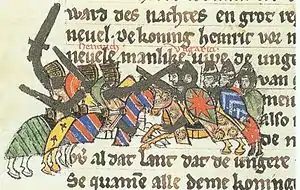933
Year 933 (CMXXXIII) was a common year starting on Tuesday (link will display the full calendar) of the Julian calendar.
| Millennium: | 1st millennium |
|---|---|
| Centuries: | |
| Decades: | |
| Years: |
| 933 by topic |
|---|
| Leaders |
|
| Categories |
|
| Gregorian calendar | 933 CMXXXIII |
| Ab urbe condita | 1686 |
| Armenian calendar | 382 ԹՎ ՅՁԲ |
| Assyrian calendar | 5683 |
| Balinese saka calendar | 854–855 |
| Bengali calendar | 340 |
| Berber calendar | 1883 |
| Buddhist calendar | 1477 |
| Burmese calendar | 295 |
| Byzantine calendar | 6441–6442 |
| Chinese calendar | 壬辰年 (Water Dragon) 3629 or 3569 — to — 癸巳年 (Water Snake) 3630 or 3570 |
| Coptic calendar | 649–650 |
| Discordian calendar | 2099 |
| Ethiopian calendar | 925–926 |
| Hebrew calendar | 4693–4694 |
| Hindu calendars | |
| - Vikram Samvat | 989–990 |
| - Shaka Samvat | 854–855 |
| - Kali Yuga | 4033–4034 |
| Holocene calendar | 10933 |
| Iranian calendar | 311–312 |
| Islamic calendar | 320–322 |
| Japanese calendar | Jōhei 3 (承平3年) |
| Javanese calendar | 832–833 |
| Julian calendar | 933 CMXXXIII |
| Korean calendar | 3266 |
| Minguo calendar | 979 before ROC 民前979年 |
| Nanakshahi calendar | −535 |
| Seleucid era | 1244/1245 AG |
| Thai solar calendar | 1475–1476 |
| Tibetan calendar | 阳水龙年 (male Water-Dragon) 1059 or 678 or −94 — to — 阴水蛇年 (female Water-Snake) 1060 or 679 or −93 |

King Henry I defeats the Magyars (c. 1270)
Events
Europe
- Spring – Hugh of Provence, king of Italy, launches an expedition to Rome to remove the Roman ruler (princeps) Alberic II and avenge his humiliation (see 932). It fails, however, as Roman civic militias repel the Lombard army. Hugh ravages the Italian countryside, before he withdraws to Pavia.[1]
- March 15 – Battle of Merseburg: King Henry I ("the Fowler") defeats the Magyars near Merseburg after his refusal to pay the annual tribute. During Henry's lifetime they never raid the East Frankish Kingdom again.[2]
- William I ("Longsword"), duke of Normandy, recognizes King Rudolph as his overlord. In turn he gives William the Cotentin Peninsula and the Channel Islands.[3]
England
- Prince Edwin, the youngest son of the late King Edward the Elder, is drowned en route to the West Frankish Kingdom and buried at Saint Bertin.
Africa
- Fatimid forces fail to seize the Maghreb al-Aqsa (modern Morocco) from the local Berber tribes allied to the Spain-based Caliphate of Córdoba.[4]
Deaths
- March 10 – Li Renfu, Chinese warlord and governor
- March 16 – Takin al-Khazari, Abbasid governor of Egypt
- November 21 – Al-Tahawi, Arab imam and scholar (b. 853)
- December 9 – Li Congrong, prince of Later Tang
- December 15 – Li Siyuan, emperor of Later Tang (b. 867)
- December 18 – Yaonian Yanmujin, Chinese empress dowager
- Acfred II, count of Carcassonne and Razès (France)
- Adelolf, count of Boulogne (approximate date)
- Alfonso IV, king of León and Galicia (Spain)
- Du Guangting, Chinese Taoist priest and writer (b. 850)
- Ealdred I, ruler ('king') of Bernicia (approximate date)
- Edwin, English prince and son of Edward the Elder
- Fujiwara no Kanesuke, Japanese nobleman (b. 877)
- Harald Fairhair, king of Norway (approximate date)
- Ibn Duraid, Arab poet and philologist (b. 837)
- Mu'nis al-Muzaffar, Abbasid general
- Shaghab, mother and de facto co-ruler of Al-Muqtadir
- Tryphon, patriarch of Constantinople
References
- . Italian History - Timeline Lombard Leagues Board, p. 11.
- Timothy Reuter (1999). The New Cambridge Medieval History, Volume III, p. 543. ISBN 978-0-521-36447-8.
- Pierre Riché, The Carolingians: A Family who Forged Europe, trans. Michael Idomir Allen (Philadelphia: University of Pennsylvania Press, 1993), pp. 252–253.
- Gilbert Meynier (2010) L'Algérie cœur du Maghreb classique. De l'ouverture islamo-arabe au repli (658-1518). Paris: La Découverte; p. 41.
This article is issued from Wikipedia. The text is licensed under Creative Commons - Attribution - Sharealike. Additional terms may apply for the media files.